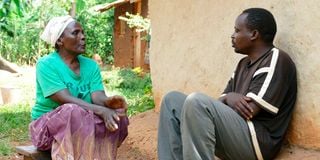'When they direct people to our place, they say that home with a madman’

Emily Asaichi with her son Edward Asaichi, who has mental illness, at their home in Emmabwi Village, Vihiga County.
What you need to know:
- Fifteen years ago, her son Edward Asaichi brimmed with youthful energy.
- When these words reach Emily Asiachi's home, they pierce through her like a sword.
This story starts with a hollow refrain — ‘I don’t know’. These are words that Emily Asiachi murmured many times in the course of our conversation.
At the end of the interview, we expected a final sigh, anything to bookend the raw emotions we had traversed in the past hour.
But instead, “I don’t know,” is what she murmured in reference to what's ailing her son. She said the words in Swahili.
The road to her homestead winds through Luanda market, a place shrouded in whispers about the number of mentally ill individuals who frequent the market— whispers that paint them as victims of curses or witchcraft.
Here, mental illness isn’t a medical condition; it’s a badge of shame, a mystery brushed aside with a dismissive, “it’s witchcraft.”
On a random day, you are likely to see them walking from one corner of the market to another.
Betty Owino, a businessperson at the market, told Healthy Nation: “There are many of them. Every morning when we come to the market, there is a new face. I think some of them are brought here from other places, maybe because of the peculiarity associated with this market.”
The other locals we spoke to pointed accusing fingers at everything else but clinically diagnosed conditions. A curse, or witchcraft perhaps? This is what they attach to anything that’s a mystery to them —past, present and future.
Yet, when these words reach Emily's home, they pierce through her like a sword.
“Someone points a stranger towards my home using my son's illness as a landmark: “The place with the ‘madman”, she said.

Edward Asaichi, who has mental illness, at his rural home in Emmabwi Village, Vihiga County.
Fifteen years ago, her son Edward Asaichi brimmed with youthful energy. After completing his primary education, he landed a sponsorship for an artisanry course.
“He did well and got an opportunity to work in a different county while living with a relative. He would occasionally visit and regale us with stories about his new job and living far from home. He is the youngest of my eight children,” she said.
One return trip chilled her to the bone.
“A few days into his stay, Edward who stood before me was a ghost of his former self. I noticed that he was mumbling through usual easy conversations and his movements had become erratic and unpredictable. His life seemed clouded and distant. And he didn’t care about hygiene so jiggers started to ravage his body. I knew, I just knew that something was wrong with him,” she offered.
Read: Justice Anna Mwaure - The day doctor called to break news of my daughter’s death on my birthday
Denial clouded Emily's judgment at first. Convinced something malicious had befallen Edward, she bypassed medical help for a different kind of solace.
Instead of doctor appointments, her days were filled with journeys to various religious shrines seeking answers.
In a 2020 study published in the East African Journal of Traditions, Culture and Religion, a researcher examined the impact of cultural beliefs on mental health on select communities in Western Kenya.
“Cultural beliefs play a major role in the diagnosis and treatment of many mental health problems. When people approach the mental health system, they bring with them their values, belief system and cultural background to the treatment encounters,” observed Caroline Amunga, lead author of the study.
Emily’s desperate search for answers at various places of worship proved to be fruitless.
“We couldn’t afford proper treatment and even right now, I cannot afford to take him to any hospital. He spends his nights talking incessantly, like a prisoner in his own mind. The organisation that once supported him to start treatment stopped because his age exceeded their programme’s limitations,” she said.
Statistics issued by Vihiga County health department in March last year indicate an increase in the number of mental disorders, with 9,431 residents undergoing psychiatric treatment.






